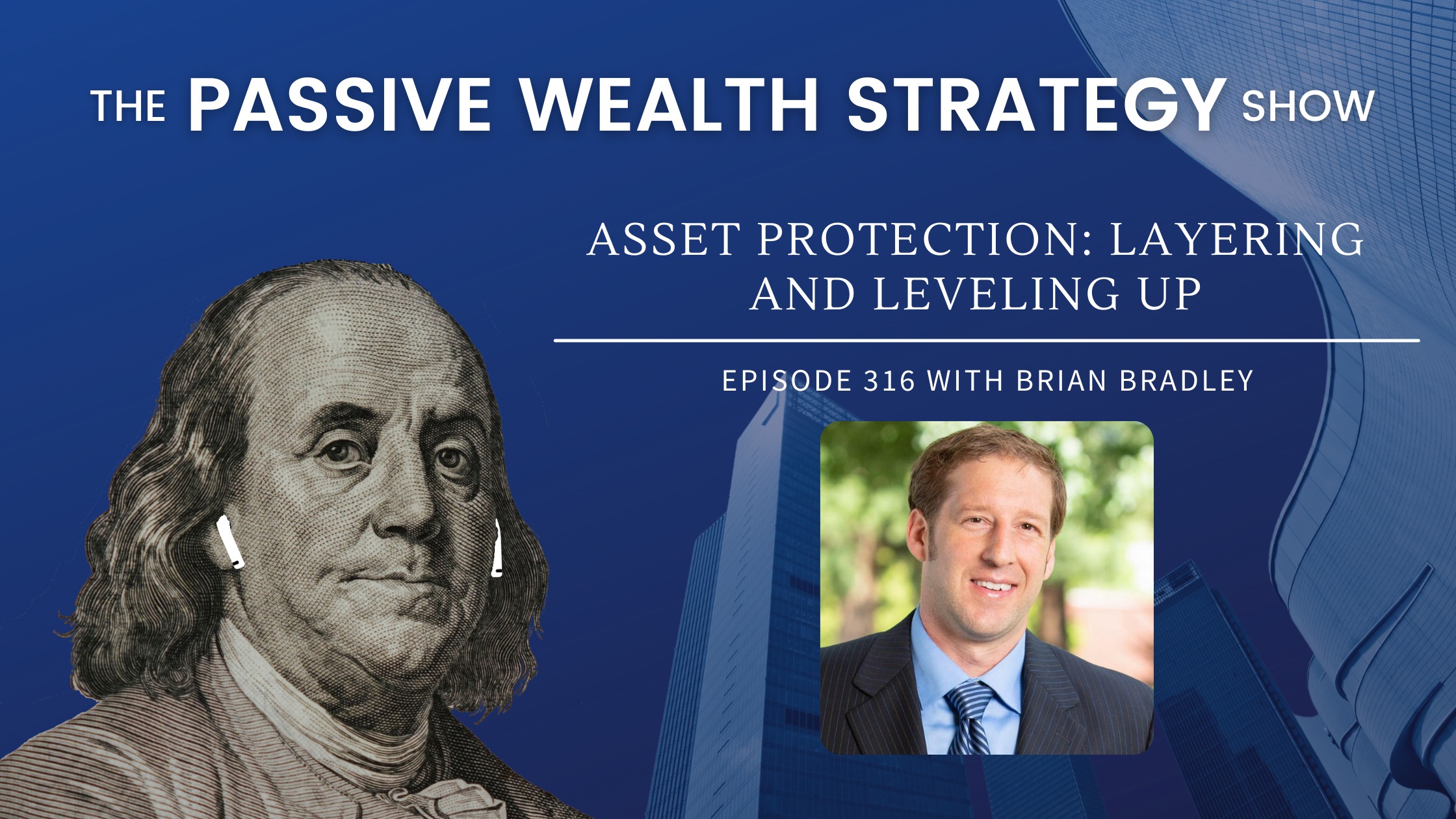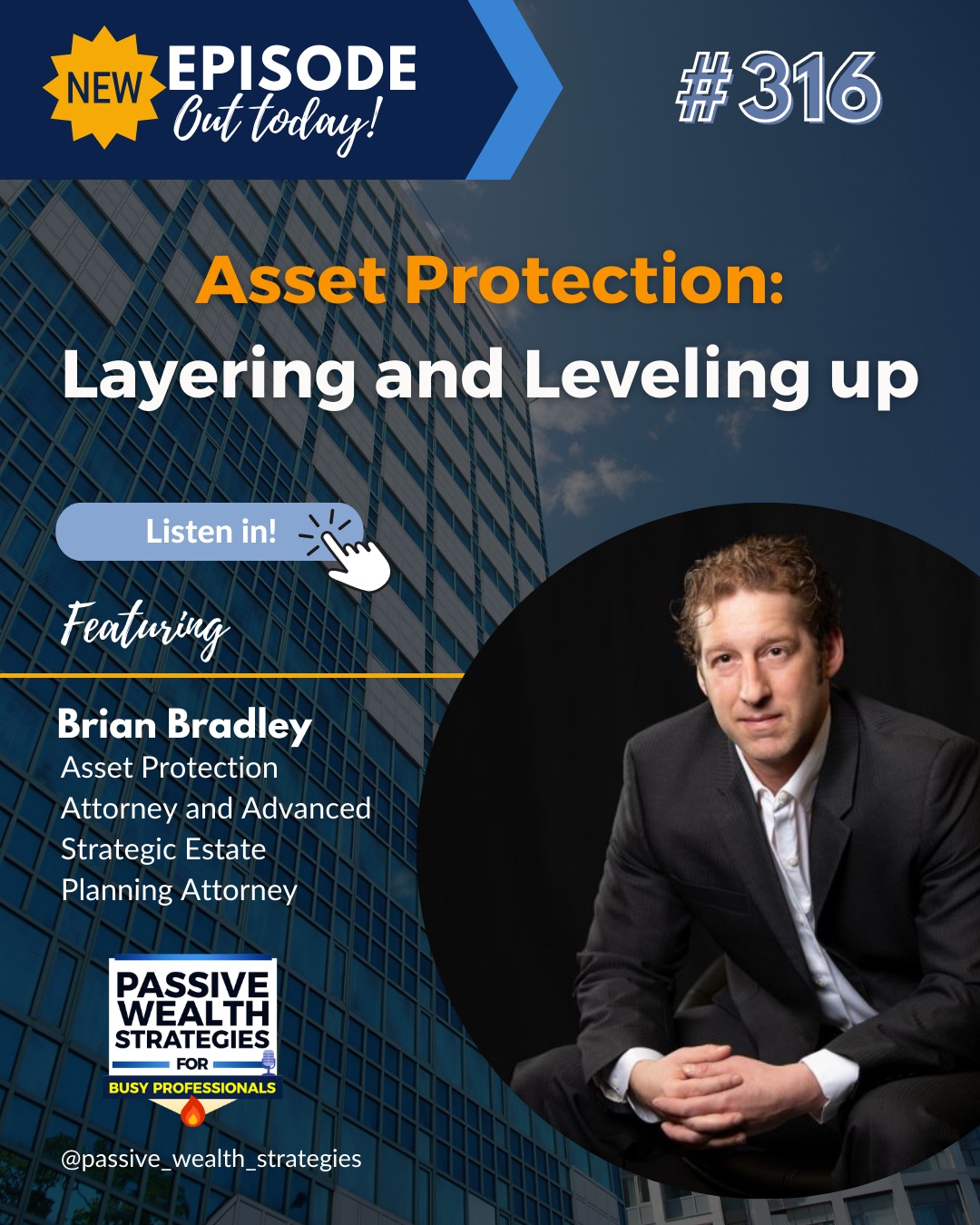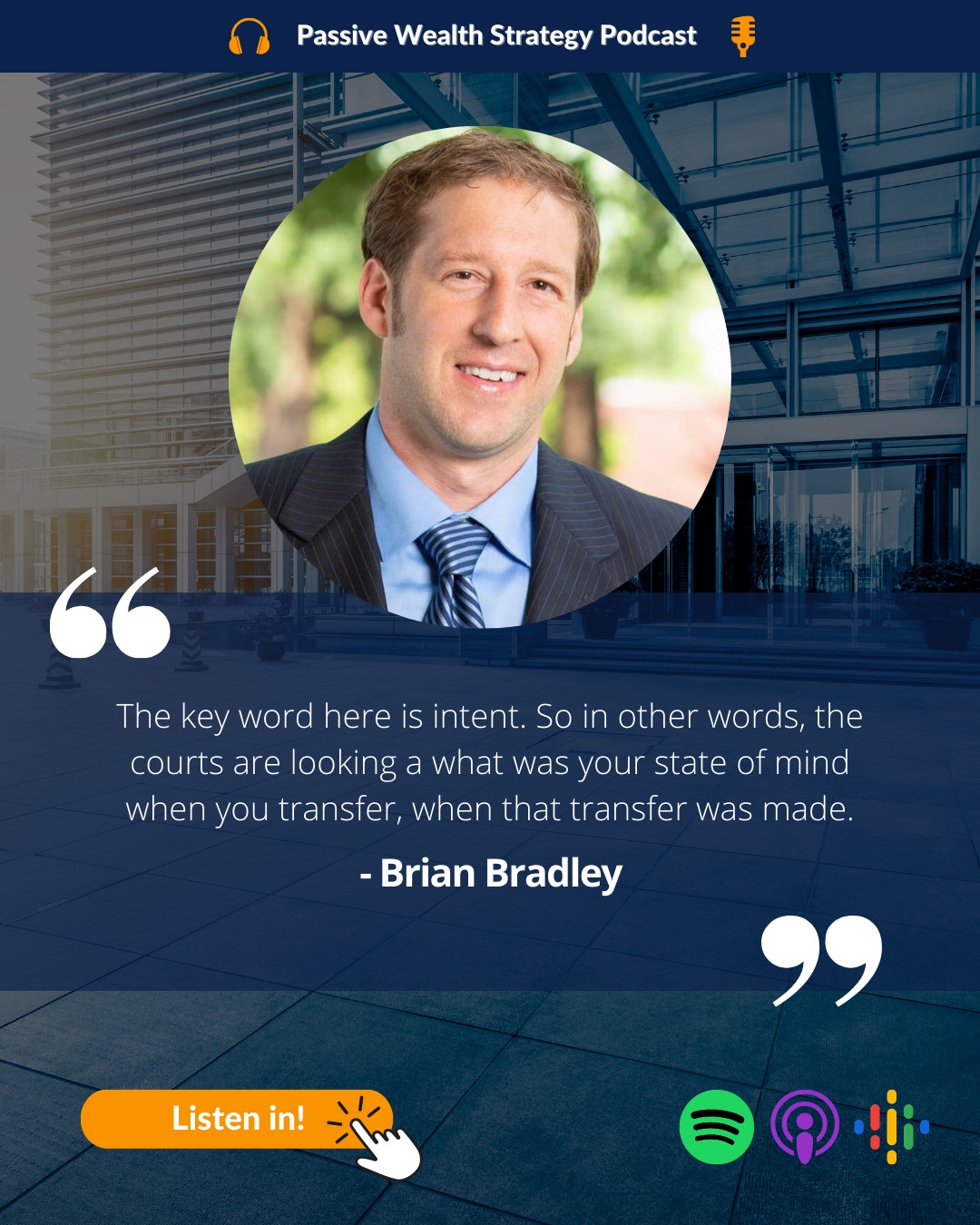
Asset Protection: Layering and Leveling up with Brian Bradley
Brian, thank you for joining us today. Thanks for coming back.
Hey, thanks, Taylor. We’re having me back and I think we’re gonna have a lot of fun, we’ll be jumping around different topics, I think as well. And maybe recapping someone asks for protection and diving into some new areas, but I definitely think we’re going to have a good talk again this time.
And I’m looking forward to, dropping whatever knowledge that I can onto your listeners and just realizing I’m not anybody’s legal guru. I’m just. What I do, and hopefully the thoughts and opinions that I have will help some people.
Absolutely. I certainly hope so as well. Now we did talk about asset protection last time around a particular strategy using overseas accounts, things like that.
But we’re going to touch on different things here today. Can you just give us a quick recap about what asset production can do for us as real estate?
Yeah, absolutely. So asset protection, like we were talking about before it’s modern estate planning, and essentially what you’re doing is just placing a legal barrier between your assets and a potential creditor before it’s needed.
And that’s really like the keyword it has to get done and set up beforehand before you’re getting sued before you’re under oath. And that’s it. It’s just a barrier, like a safe for your gold or guns or other valuables, anything of value you want to put behind that legal barrier and out of your personal name so that it’s not easily attached with a lien or reached you want to just like the rich, you’re all investing to try to become rich and wealthy.
And I love Tony Robinson. Success leaves clues the rich don’t own things in their personal names. Their businesses do their estate plans too, but not their like family estate plans or asset protection plans. Do they just get the beneficial use and enjoyment out of them while separating out the liability?
And so that’s what we’re trying to do here. And there are just different layers and differences. Stages in life and investing that you can come into. Last time we talked about the Taj Mahal of asset protection, like a bridge trust, combining an offshore trust and not domestic trust, and do this really cool hybrid.
And then how that works, lower level asset protection. You’ve got foundations of LLCs and limited partnerships. There are distinctions between those and pros and cons and how you layer them up. And there are different financial net worth markers on where you enter at which one? If you’re just starting out, you’re going to be starting out in an LLC and insurance.
You’re going to outgrow that. Then you’re going to move up to another layer, limited partnerships. Then you’re going to outgrow that. And then you’re gonna move up to the big guns, asset protection trust, and all of these things. There are different flavors.
So I wonder what you mean by you’re going to outgrow.
Say LLCs, for example, what does that really mean? Because there, as far as I know, there’s not like a legal maximum of an LLC can say only have such and such a value of revenue or anything like that, but maybe it’s practicality or something like that kind of standpoint. So what do you mean by outgrowing these certain structures?
So you look at it from So if you’re just starting out and you don’t have much personal risk and liability from a professional standpoint, you’re not a surgeon. You’re not a dumper. You’re not a lawyer, you’re not a CPA. So you don’t have much personal liability from your professional job. And you’re just starting out with your first property.
I will not come in and say, okay, Hey, I’m going to charge you $30,000 for an asset protection trust for a bridge trust, and a full setup. You’re just spending unwisely on your money. I call it like spending. I’m like, it just makes a bad decision. So you would start out small with an LLC. Then as you grow, you don’t want to be stuffing, millions of dollars, all in one, LLC.
You want to space out liability and the number of units. And then you have to balance between the amount of money and equity that’s in that LLC with the number of units and find the right. Yeah. So we try to keep the equity under $500,000 in some states it’s nearly impossible to do, if you’re investing in New York or California like that’s one property in those states, it’s going to be almost 1 million.

Asset Protection: Layering and Leveling up with Brian Bradley
So what we try to do is just match the amount of equity net that’s in the LLC with the risk that we are willing and acceptable to risk. And then another one to look at is the states. You don’t want to mix different state assets, all in one, LLC. Meaning, if you’re investing in Tennessee and Alabama, and Ohio, you don’t want to be putting all of those into one LLC, because then you’re taking a bunch of different state assets and state laws.
And if one of those assets explodes, then you’re having that state issue and problem affecting other state assets and other states. So you want to separate out assets from states and the different state LLCs, as well as manage the amount of. Net value with equity in each LLC, as well as the number of units per problem and risks in the LLC.
So as that adds up over time, you have one property, two properties, get the four properties you’re going to eventually outgrow the L the beneficial, limited liability of that LLC. Then you’re needing. And then another one then once your net worth hits, probably around $500,000 net, that will be, make more sense to clean up your system and have all those LLC owned by a management company, like a limited partnership.
So all your individual K ones that those LLCs flow directly into one taxable company, a limited partnership. So now you only have one taxable, one tax filing, not 10.
Okay. So that does save some of the complexity. Now you mentioned. Different states, things like that. And there’s, there are ways you can write, have an LLC and say Wyoming or Colorado or whatever, but your asset is not actually in that state it’s somewhere else.
Does that, help avoid some of those complications? Or would you say? That’s a great question. How do you break that out?
So that goes into some of the misconceptions of LLCs. And these are some of the big ones that I like to talk about that no one’s really being told about. And this goes to the confusion of where to even set these things up in like chasing charging order protection.
And so it’s do I go to Delaware? Do I go to Wyoming? Do I go to Texas and Nevada? And when it comes to real estate, it really comes down to an issue. What are you holding and what state is it located at? Because we have to realize real estate is different. It’s not a business, you own it as an extension of yourself.
And you’re still, that’s what you’re using this LLC for is holding companies not operating out of. So let’s say, for example, it’s California real estate that you own. And you’re a California resident and I’m going to pick on California a lot during these examples, just because a lot of people live in California.
A lot of them invest in other states or California, and it’s a very asset-protection unfriendly state. So I think it just hits a lot of nails on it, like for everybody to relate to. So in this situation, let’s say you set up a Wyoming LLC because you run it on the. And your, or your CPA or someone told you to go ahead and set up as Wyoming, LLC, but you’re a California resident owning assets, not in Wyoming by let’s say it’s just California.
What you’ve done is convert your Wyoming, LLC, to a California LLC, because you’re doing business in the state of California, because you just placed a key piece of property that’s in California in that LLC. And you have to actually register that out-of-state Wyoming, LLC, as doing business in California.
Like you legally have to do that. And so what you did, as I said, is just convert that out of state Wyoming, LLC, to a California, I’ll see. And you’re paying franchise tax in the state of California. And this is because, a judge in California or any other state, they don’t care that your LLC LLCs in Wyoming or Delaware, what they care about is it doing business in California?
Cause it’s done this big legal word called availed itself of the protection and laws of California. That’s the state, the asset is in that’s the state, the injury or damage occurred. And that’s the state you’re getting sued through because that’s where the asset is at. So it’s going to be that state’s laws that are going to apply, that they’re damaged laws, they’re tort laws or personal injury laws.
This is called outside liability from the asset, not an internal business dispute like you and I dissolving a company and we’re suing each other because now we hate each other and the companies failed. You don’t take Wyoming or Delaware. Tore and damaged laws with you to other states. So just by simply owning an out-of-state LLC, you have to do this legally, this legal thing is called registering that LLC is doing business in that state that you live in like you legally have to do this.
And so by registering it, you’ve now availed yourself of the privileges and laws of that state that you’re a resident of. So now you just gave California the jurisdictional ripe over that Wyoming, LLC. And there’s a really great case that proves his point. It’s called the Indian palms country club association.
Verse anchor bank came out in 2015 and this case lays out all the multiple legal standards that you’d have to meet to successfully beat a piercing. The corporate veil. And jurisdictional selections. And this is someone who actually set up an out-of-state Wyoming, LLC. You would not meet any of these legal standards whatsoever.
And so essentially by not meeting one of the legal standards, you now are going to have your veil pierced and you just gave California legal jurisdiction over that, LLC. So for assets that are realistic, I recommend using the state that the real estate is located in because you’re not gaining anything by using another state, you’re just doubling your maintenance costs, having to pay the personal agent of service, and in Wyoming that can get expensive in Delaware.
So just keep it simple and then properly layer, and then move up to the second layer of protection, which should be like a limited partnership, and then have your K ones or those LLCs flow into one easily managed.
Okay. So I think this gets into the next topic I wanted to hit on. You mentioned limited partnerships, one of the learn about the differences between the two of those because they both say limited but limited liability company versus limited partnership.
And it sounds like they offered them. Features and benefits and all that different costs.
It’s a great question. And so this goes to when we’re talking about different layers of asset protection, you got three layers. Think about going out skiing is cold. You have your base layer, that’s going to be an LLC.
Then you’re going to have your second layers, like your Merino wool sweater, or a cardigan for ladies. It’s going to keep you nice and warm a little bit looser on the body. That’s going to be a management company and preferably we want it to be a limited partnership for the reasons I’m going to get into next.
And then you’re going to have like your outer coat, cold weather, bad waterproof layer. That’s going to be your asset protection trust and so limited partnerships there. Life LLC. And they also have some charging order protection. And I liked them better because they have a very strong delineation between the managing partner called the general partner, the GP, and the minority partner who does nuts, so the LP portion of that and think of it as a split personality, so they have two different classes of ownership that have different functions, which LLCs do not have. And so we like having both a general partner. Chris and the limited partner interests. And we use that limited partnership as the starting point or the LP as the starting point for clients as that holding company or management company.
And then eventually we just add a very strong asset protection trust or bridge trust to the top of the. To own that limited partnership. And it’s really the combination of the two that work together that we capitalize on. And so just some of the very specific reasons, I prefer a limited partnership and specifically an Arizona limited partnership over, for example, a Wyoming, LLC, or Delaware, LLC as, or any LLC as that second layer of protection are you have exclusive charging order protections in Arizona as the only remedy for creditors of a partnership.
You have an actual statutory, and this is really important because statutes are a higher priority of law than like case law, because they’re actually written down and they’re not left for open interpretations by other judges. So you have an actual statutory distinction between the general partners and the limited partners by statute.
And this is better than LLCs because. Oh, L C’s can only do this by an operating agreement. And then the court will have to interpret that. So you’re leaving that operating agreement, open to the interpretation of a judge who will change his mind depending on the day and what he ate for breakfast. And you’re seeing it like judges are not following the legal president anymore.
And especially in certain risky states like California, like all the east coast, west coast states. And so we also. ARS sec, section 29 dash 3 3 3, which specifically allows for a limited partnership to make what’s called this really fancy thing called a unilateral withdrawal from a limited partnership on a predefined amount of duress, meaning like a lawsuit.
And so this is unique only to an Arizona limited partner. But this is exactly what you need to allow an asset protection trust like that top third layer to disconnect from that holding company during a dresser, a lawsuit, and this can only be done with limited partnerships. You can’t do this at all with LLCs without starting to expose yourself to a fraudulent transfer argument, which we’ll break down later on what that even means like fraudulent transfers.
And so just those already are really a good list of why I prefer limited partnerships, but then a few more like the AC limited partnership is perpetual. Whereas. Every other state has an annual report and filing fees for LLCs that you have to maintain every year. Arizona doesn’t require a listing of the limited partners.
You don’t need to list GP partners at all by name, by nature, limited partners that are completely private. So you get some built-in privacy, statutorily with that. And then for tax filing purposes, which is really important, your limited partnership cannot be a disregarded entity where. LLC single members or all disregarded entities coming up to you, which is great for tax purposes, but it’s horrible for litigation and liability because though it’s disregarded to you from taxes, that means it’s also disregarded to you for lawsuits and liability.
And LLCs just with one member they’re automatically considered like I said, a disregarded entity, and that’s not very good for liability issues and lawsuits. Limited partnerships by nature cannot be disregarded entities.

The key word here is intent. So in other words, the courts are looking a what was your state of mind when you transfer, when that transfer was made.
Brian Bradley Tweet
So how does that work for tax purposes? Are you getting hit with double taxation in that case?
Since it’s not a disregarded entity, how can you manage that?
No. And so the tax filings flow towards you. So you’re going to be, all asset protection is tax neutral. It’s just your plant. You get to play off of the different ownership, classes of limited partnerships. Eventually, you want your asset protection trust to own that limited partnership, and then all you are as the managing member of it.
Okay. And as you get larger that the cash flows are that the income flows like upward up the structure to the. Asset protection trust. And then to you, or I guess just.
The income would stay connected to the management company, like your business bank account there. And you would just pay yourself disbursements out of that and your own private account, but what owns everything eventually is your bridge trust because, or your asset protection trust because it owns up that management company.
So you’re the managing member of that limited partner. And then you’re the beneficiary and creator of your own asset protection trust. And so that way you maintain control of your assets, you’re managing your assets. You’re the beneficiary of your own trust that you created? It’s just that trust owns a limited partnership and then that trust eventually you want to have, when you get about 1 million-plus unprotected net, you want to be able to benefit and play off of other jurisdictions in other countries that lack recognition of US court orders.
Okay. Once you’re getting pretty big. Now you mentioned one thing in there that I also wanted to cover fraudulent transfers, and I know, there are probably folks out there listening that maybe own a couple of rental properties, or they got started because they’ve lived in a house and moved out of it, but they kept it titled in their own name.
Maybe they’re not going to send it to an LLC. And what are some important considerations there when transferring personal assets into a business’s name, especially when it comes to liability?
Yeah. So when you’re transferring assets, like the big issue and the thing that’s always going to be argued is going to say this was a fraudulent transfer or, avoidable transaction, what is called now?
And it’s often one of the most asked issues with clients. And it’s also one of the most misunderstood of what they are because you’re playing off with different definitions of fraud, fraudulent transfers, and how they all work. And so to break these concepts down a fraudulent transfer, a conveyance is a transfer of ownership of an asset.
So like transferring yours. Made for little or no consideration, meaning like the other party really didn’t get anything of value in return for it at all. And then here’s a caveat of it. It has to be done with the intent to hinder delay or defeat the claim of a creditor. So the person issuing you. So you have to have the intent to, hinder delay their claim against you.
The keyword here is intent. So in other words, The courts are looking at. What was your state of mind when you transfer when that transfer was made? And this state of mind also has to be combined with an actual effect, that the transfer actually delayed or hindered or defrauded a creditor.
So if you’re doing this stuff in the middle of a lawsuit, obviously, here comes the issue with that as you’re too far down the rabbit hole to be transferring assets around. And so if you don’t have that state of mind and you don’t have a lawsuit coming at you right now in your sedan.
It’s setting all this stuff up and transferring assets during times of peace. There’s no fraudulent conveyance. And so this is the importance of being proactive and planning before you need it. Now I want to compare this to fraud, which is completely different. So fraud is an intentional misrepresentation of a material fact to induce someone to act or stop or refrain from acting to their detriment.
So what does it really just a fantasy thing of saying there are two different definitions? One is a fraudulent transaction conveyance. Another one is fraud and fraud is a crime. And so fraudulent transfers. Our nuts. And what we call a fraudulent transfer is just a supplemental or secondary proceeding where you’re getting sued.
All right. And the person suing, you start finding out what assets you own by disclosures and discovery that the court will order. And if you’re discovered to have made a transfer for little or no consideration within a certain amount of time, generally about five years, some states like California is like extreme, like a 10 year lookback period.
That other part of the person was suing. You were going to ask that judge to undo all those transfers and say, bring that money back. And that’s the remedy because now they’re going to have you undo that transfer to give the creditor access to it. And so this is where the importance of jurisdiction and how it relates to fraudulent conveyance really comes into play.
The reason why, for example, an offshore trust is so powerful in this regard, is that in order to undo a transient. That court has to have the power to tell the person that did the transfer to, the person that you gave that asset to, to give it back. And so any court in the US doesn’t have that power to tell an offshore cook island, trustee, what to do or to tell them that, give that asset back.
We’re just going to tell them no go pound sin. We are the cook islands. We are statutorily, non recognizing any countries corridor or judgments your us court orders and judgments. Have no reach here whatsoever. Now compare this to anything to the U S any system that’s purely domestic in the US does not have that ability to say no.
And this is because we have the full faith and credit clause of the constitution. And so that’s the power of adding an offshore component eventually when it makes financial sense and you have over 1 million-plus of assets and high risk, high liability is you want that power to say no.
Okay. So that does help that.
The cook islands example, they just say, no, not acceptable, but that is a bit concerning that many states have a five-year look back. And I think California tenure that’s, that’s a long time. That’s forgetting 10. Five years is just a while.
It’s a long time. And there is this important case cooker for Steelman in California that came out in 2012 and was approved by the court of appeals.
And so it was this a pool construct. Yeah, I made this cool for this company five years before ever being sued, made a pool for a residential pool at the crack, got sued for it. Five years later, he created this asset protection trust five years before any of this happened and ended up getting sued. And so cucumbers, dooming, the court said you work in construction.
And you should know eventually, sometime in your career, like you’re going to get sued. And so we’re going back in and that completely changed the landscaping of asset protection because. What California’s were doing was going to Nevada and creating the bad asset protection trust. And the court said you’re not a resident of Nevada too bad, so we’re not recognizing it.
And even though you created this five years before you were being sued, you should have known and foresaw a possibility that you may get sued at some point in the future of owning a business. And so California, that case cucumber Stewman completely destroyed a functional asset protection trust for California residents.
So there’s a very fine line of what we have to do for California residents, which is eventually adding that shore cook islands.
Or I’m also, reading between the lines, just move out of California.
But even still, then now you’re getting cases were just purely domestic trust, even if you’re resonant of them are starting to get pierced.
And then people now are buying assets all over them, wherever the next deal is. So you’re just buying state by state, wherever you’re at. The one, the good thing about our country, full faith, and credit clause and states having state rights is also one of the things that, weekends, asset protection here in the US is the full faith and credit clause.
You can’t run from judgments. And even if it’s a fraudulent wrongful judgment or over coverage judgment, you know where you’re getting these extreme damages, like there was just this case in Florida of all places, Florida, there was this guy in this family who owned an Airbnb.
I just came out what’s that they Florida man own an Airbnb, keep pay on an Airbnb rented it out.
The guy that he rented it to, was like pounding bottles of whiskey starting at two in the afternoon, decided at one 30 or two in the morning and do a header into a shallow pond and broke his neck, became a quadriplegic, sued the owner of the property and then got an $11 million judgment award, man.
And Florida, like you, would expect to hear that in California. And so this is Florida. And so this is where it’s starting to come to a, it doesn’t matter what state you’re a resident of. Now you need to start looking at stronger layers of asset protection.
How can you even, that’s a, there are probably details to the case.
They just thought it was negligent negligence because he allowed a low water level pond to develop on his property. And so it was negligence on him and it’s okay. But the guy was like, had to drink like two bottles of whiskey all day long and then decided to go take a header and do a pond.
I wonder if it’s if it had been a pool, if they had, they would have found the same thing. She, you can still. Dive into shallow water in a pool.
Exactly. And it’s at some point you’re going to, you should be responsible for the negligence of your own decisions.
Yeah, totally. Interesting.
Right now we’re going to take a quick break for ourselves. All right, Brian, I’ve normally got three questions. I ask every guest on the show, but you’ve been on the show before. You’ve answered those questions before. Got three new ones for our awesome returning guests. Are you ready to go? Let’s do it. All right.
First one. What is your favorite personal book? Not a business book, but your favorite book to read for personal.
Yeah, that’s a great one. I really liked the outcomes. And so it’s a great personal journey book, through the eyes of a shepherd who’s on his personal legend and trying to find his treasure.
And I’m not going to ruin the book story for you, but if you like investing it also hits on. On those, sleeves as well. And it’s told it’s a really quick read, very easy read, and you’re going to, fall in love with the story of the book really fast and, start, figuring out your own personal legend.
Nice, nice. We had your favorite personal book, but now we get to the question that I think is a little more common on these types of shows. What is your favorite business?
Yeah, I think I really liked the second Robert Kiyosaki book. The cash flow quadrant, which is, not rich dad, poor dad.
Then he breaks down the principles even farther down in the cash flow quadrant. So I think that’s a really good one. Right there. Yeah. And I like bankers’ codes because I like investing more like a bank.
Nice. I have to admit, I have not read the cash flow quadrant. I’m going to put that one on my list.
Someone’s quiet.
That’s a good one.
Yeah. A question, I think that many of us are thinking about these days, especially, it seems like a pandemic is going to go on forever, but it will end someday. Where’s the next place you’re going. Once things have really opened up after COVID.
Yeah, I’m a toss-up between two places.
Japan. Or Iceland and I haven’t, like I really want to go to one or the other, like obviously Japan right now, it seems like out of the question because of, COVID variants now and so I’m leaning more towards Iceland.
Fair enough. As we record this, I think I read earlier today that Francis banning non-vaccinated us visitors vaccinated, people can still get it.
We’ll see if that even changes later on. No, exactly.
And so I’ve been doing more just domestic traveling and visiting family and more low-key stuff, but I’m looking definitely looking forward and itching to get back into some international travel.
I totally agree with you. Totally agree. Thank you for coming back to the show.
It’s been great talking with you once again and getting into a different aspect of asset protection for real estate investors. If folks want to get in touch, if they want to reach out, they want to ask some questions about. Asset protection or have a conversation about your services, where can they track you down?
Yeah, they can jump on my website. www.btblegal.com and I use it more as an educational resource for that. A lot of case law good educational videos, tons of frequently asked questions sections there. Or they can just email me, Brian, [email protected] and pretty recent.
Awesome. Once again, thank you for coming back to the show. It’s been great talking with you once again to everybody out there. If you’re enjoying the show and you use the apple podcast, please take a moment, leave us a rating and review the show. Five stars. If you don’t mind. I appreciate that so much that helps other people learn about the show because that helps us rank higher in the apple podcast ecosystem there.
And I’m always honest with you guys that gives me a warm and fuzzy feeling because I get to see that you’re engaging with the content and you’re escaping and wall street. Along with us. If you know anyone who could use a little bit more passive wealth in their lives, please share the show with them and bring them into the tribe.
Thank you for tuning in once again. I hope you have a great rest of your day and we’ll talk to you on the next one. Bye-bye.

Asset Protection
About our Guest

Brian Bradley
Brian T. Bradley, Esq. is a nationally recognized Asset Protection Attorney. He has been interviewed and a featured guest on many top shows such as: Flipping America Podcast with Roger Blankenship the “Flipping America Guy” and member of the Forbes Magazine Real Estate Council. SharkPrenuer hosted by Kevin Harrington (the original Shark on the hit TV show ‘Shark Tank’ and inventor of the infomercial), Simple Passive Cash Flow with host mastermind investor Lane Kawaoka, White Coat Investors, Best Advice Ever with super host Joe Fairless (the host of the longest running REI show).
Brian was selected to the Best Attorney’s of America’s List 2020, Lawyers of Distinction List three years in a row (2018, 2019, 2020,) Super Lawyers Rising Star List 2015, nominated to Americas Top 100 High Stake Litigators List, nominated to the 2017 Law Firm 500 Award. Brian also writes on high-end asset protection.
Episode Show Notes
Brian T. Bradley, Esq. is a nationally recognized Asset Protection Attorney. He has been interviewed and a featured guest on many top shows such as Flipping America Podcast with Roger Blankenship the “Flipping America Guy” and a member of the Forbes Magazine Real Estate Council. SharkPrenuer hosted by Kevin Harrington (the original Shark on the hit TV show ‘Shark Tank’ and inventor of the infomercial), Simple Passive Cash Flow with host mastermind investor Lane Kawaoka, White Coat Investors, Best Advice Ever with super host Joe Fairless (the host of the longest-running REI show).
Brian was selected to the Best Attorney’s of America’s List 2020, Lawyers of Distinction List three years in a row (2018, 2019, 2020,) Super Lawyers Rising Star List 2015, nominated to America’s Top 100 High Stake Litigators List, nominated to the 2017 Law Firm 500 Award. Brian also writes on high-end asset protection
[00:01 – 03:13] Opening Segment
- Get to know Brian Bradley
- Bio
[03:14 – 12:38] Asset Protection for Real Estate Investors
- Just Like Modern Estate Planning
- “Success leaves clues” – Tony Robbins
- Outgrowing LLCs
- How to Manage Different State LLCs
- What are you holding?
- What state is it located at?
[12:39 – 27:02] Asset Protection: Layering and Leveling Up
- Limited liability company versus limited partnership
- How to manage your tax filings
- Fraudulent Transfers
- Fraudulent conveyance versus fraud
- The power of adding an offshore component
- Looking for stronger layers of asset protection
[27:03 – 33:51] Closing Segment
- Quick break for our sponsors
- Groundfloor offers short-term, high-yield real estate debt investments to the general public. Check www.passivewealthstrategy.com/groundfloor/ to get started.
- Brian’s favorite personal book
- Brian’s favorite business book
- Where’s your travel destination after the pandemic?
- Japan or Iceland
- Connect with my guest. See the links below.
Resource Mentioned:
Tweetable Quotes:
“You don’t want to mix different state assets all in one LLC.” – Brian Bradley
“At some point, you should be responsible for the negligence of your own decisions.” – Brian Bradley
————
Connect with Brian Bradley through [email protected], Facebook, Youtube, and LinkedIn. Visit their website https://btblegal.com/.
Invest passively in multiple commercial real estate assets such as apartments, self storage, medical facilities, hotels and more through https://www.passivewealthstrategy.com/crowdstreet/
Participate directly in real estate investment loans on a fractional basis. Go to www.passivewealthstrategy.com/groundfloor/ and get ready to invest on your own terms.
LEAVE A REVIEW + help someone who wants to explode their business growth by sharing this episode or click here to listen to our previous episodes







